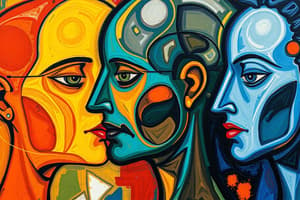Podcast
Questions and Answers
In the Mr Clean/Mr Dirty study, what effect did encountering an impressive competitor have on the subjects' self-esteem?
In the Mr Clean/Mr Dirty study, what effect did encountering an impressive competitor have on the subjects' self-esteem?
- Increase in self-esteem
- Decrease in self-esteem (correct)
- Self-esteem remained the same
- No effect on self-esteem
Most people tend to evaluate themselves in an unrealistically negative way.
Most people tend to evaluate themselves in an unrealistically negative way.
False (B)
What percentage of students rated themselves above average in 'leadership ability' in the large survey mentioned?
What percentage of students rated themselves above average in 'leadership ability' in the large survey mentioned?
70%
People’s observations of their own behavior are not entirely __________.
People’s observations of their own behavior are not entirely __________.
Match the following concepts with their descriptions:
Match the following concepts with their descriptions:
What psychological period follows the phallic stage?
What psychological period follows the phallic stage?
What drives the id according to Freud's theory?
What drives the id according to Freud's theory?
Freud believed that unresolved conflicts in the phallic stage can lead to difficulties in adulthood.
Freud believed that unresolved conflicts in the phallic stage can lead to difficulties in adulthood.
The superego develops after the ego according to Freud's theory.
The superego develops after the ego according to Freud's theory.
What is the term for the process in which a child adopts the characteristics of the same-sex parent?
What is the term for the process in which a child adopts the characteristics of the same-sex parent?
During the ___ stage, the child's libido is dormant.
During the ___ stage, the child's libido is dormant.
What is the term used for the biological energy resulting from the id?
What is the term used for the biological energy resulting from the id?
The ______ mediates between the demands of the id and the pressures of external reality.
The ______ mediates between the demands of the id and the pressures of external reality.
Match the following stages with their descriptions:
Match the following stages with their descriptions:
What happens during the genital stage according to Freud?
What happens during the genital stage according to Freud?
Match the following parts of personality with their descriptions:
Match the following parts of personality with their descriptions:
Which statement best describes the role of the superego?
Which statement best describes the role of the superego?
Carl Rogers divided personality structure into multiple constructs.
Carl Rogers divided personality structure into multiple constructs.
Freud emphasized that only nature influences personality development.
Freud emphasized that only nature influences personality development.
What defense mechanism allows sexual energy to be redirected towards school work or hobbies during the latency stage?
What defense mechanism allows sexual energy to be redirected towards school work or hobbies during the latency stage?
Freud believed that the proper outlet for the sexual instinct in adults is through ___ intercourse.
Freud believed that the proper outlet for the sexual instinct in adults is through ___ intercourse.
What does self-concept primarily refer to?
What does self-concept primarily refer to?
The self-concept is described as a single dimension without any complexities.
The self-concept is described as a single dimension without any complexities.
What term do Markus and other psychologists use to describe the self-concept that is currently accessible?
What term do Markus and other psychologists use to describe the self-concept that is currently accessible?
Self-schemas are developed from past experiences and are concerned with one's __________ traits.
Self-schemas are developed from past experiences and are concerned with one's __________ traits.
Match the following terms with their definitions:
Match the following terms with their definitions:
Which of the following accurately describes 'possible selves'?
Which of the following accurately describes 'possible selves'?
Each self-schema influences how individuals interpret and process information about themselves.
Each self-schema influences how individuals interpret and process information about themselves.
What influences possible selves according to Markus?
What influences possible selves according to Markus?
The beliefs that individuals hold about their __________ can include both strengths and weaknesses.
The beliefs that individuals hold about their __________ can include both strengths and weaknesses.
Which of the following is NOT a type of belief included within self-schemas?
Which of the following is NOT a type of belief included within self-schemas?
What is self-discrepancy?
What is self-discrepancy?
Positive selves are images that one wants to achieve.
Positive selves are images that one wants to achieve.
What are the three types of self-perceptions according to self-discrepancy theory?
What are the three types of self-perceptions according to self-discrepancy theory?
When the actual self is at odds with the ideal self, individuals may experience ______ emotions.
When the actual self is at odds with the ideal self, individuals may experience ______ emotions.
Match the following types of self-perceptions with their definitions:
Match the following types of self-perceptions with their definitions:
What emotion is likely to be triggered when one's actual self does not meet their ought self?
What emotion is likely to be triggered when one's actual self does not meet their ought self?
Self-esteem increases when individuals meet their personal standards.
Self-esteem increases when individuals meet their personal standards.
What relationship does Tiffany's self-discrepancy illustrate?
What relationship does Tiffany's self-discrepancy illustrate?
Possible selves can be both positive and ______.
Possible selves can be both positive and ______.
Which of the following conditions indicates a self-discrepancy?
Which of the following conditions indicates a self-discrepancy?
Flashcards
The Id
The Id
The part of our personality driven by basic biological needs and desires. It seeks immediate gratification and operates on the pleasure principle.
The Superego
The Superego
The part of our personality that represents our conscience and internalized moral standards. It develops around age 4-5 and focuses on ideal behavior, punishing us with guilt when we deviate.
The Ego
The Ego
The mediator between the Id and the Superego. It operates on the reality principle, balancing our desires with what's realistically possible and socially acceptable.
Libido
Libido
Signup and view all the flashcards
Pleasure Principle
Pleasure Principle
Signup and view all the flashcards
Morality Principle
Morality Principle
Signup and view all the flashcards
Reality Principle
Reality Principle
Signup and view all the flashcards
Self-Concept
Self-Concept
Signup and view all the flashcards
Self-Schema
Self-Schema
Signup and view all the flashcards
Working Self-Concept
Working Self-Concept
Signup and view all the flashcards
Possible Selves
Possible Selves
Signup and view all the flashcards
Self-Schema Influence
Self-Schema Influence
Signup and view all the flashcards
Activating a Self-Schema
Activating a Self-Schema
Signup and view all the flashcards
Possible Selves Development
Possible Selves Development
Signup and view all the flashcards
Possible Selves and Motivation
Possible Selves and Motivation
Signup and view all the flashcards
Possible Selves and Achievement
Possible Selves and Achievement
Signup and view all the flashcards
Self-Schema Distinctness
Self-Schema Distinctness
Signup and view all the flashcards
Phallic Stage
Phallic Stage
Signup and view all the flashcards
Repression
Repression
Signup and view all the flashcards
Identification
Identification
Signup and view all the flashcards
Latency Stage
Latency Stage
Signup and view all the flashcards
Phallic Stage Conflicts
Phallic Stage Conflicts
Signup and view all the flashcards
Genital Stage
Genital Stage
Signup and view all the flashcards
Altruistic Motives
Altruistic Motives
Signup and view all the flashcards
Actual Self
Actual Self
Signup and view all the flashcards
Ideal Self
Ideal Self
Signup and view all the flashcards
Ought Self
Ought Self
Signup and view all the flashcards
Self-Discrepancy
Self-Discrepancy
Signup and view all the flashcards
Self-Discrepancy Theory
Self-Discrepancy Theory
Signup and view all the flashcards
Self-Congruence
Self-Congruence
Signup and view all the flashcards
Dejection-Related Emotions
Dejection-Related Emotions
Signup and view all the flashcards
Negative Possible Self
Negative Possible Self
Signup and view all the flashcards
Positive Possible Self
Positive Possible Self
Signup and view all the flashcards
Possible Selves as Motivators
Possible Selves as Motivators
Signup and view all the flashcards
Positive Self-Distortion
Positive Self-Distortion
Signup and view all the flashcards
Mixed Self-Distortions
Mixed Self-Distortions
Signup and view all the flashcards
Mr. Clean/Mr. Dirty Study
Mr. Clean/Mr. Dirty Study
Signup and view all the flashcards
Social Comparison
Social Comparison
Signup and view all the flashcards
Reference Group
Reference Group
Signup and view all the flashcards
Study Notes
Personality
- Personality is defined as stable, internal factors that make one person's behaviour consistent over time and different from others' actions in similar situations.
- Individualistic cultures prioritise self-directedness and autonomy, emphasizing individuality and personal characteristics.
- Collectivistic cultures emphasize interdependence, family, relationships, and conformity to social norms that describe roles and expectations.
Reliability vs Validity
- Reliability refers to the consistency of personality assessment results across situations and time.
- Validity refers to whether a test accurately measures the intended personality aspects.
- Reliable tests produce similar results with repeated use; valid tests accurately assess the target personality traits.
Theories of Personality
- Freud's Psychoanalytic Approach: The unconscious mind is a reservoir of thoughts, feelings, and memories; personality is shaped by early childhood experiences.
- The id is the biological aspect driven by the pleasure principle.
- The ego mediates between the id and superego, operating on the reality principle.
- The superego represents social and moral standards.
- Trait Theories: Personality is composed of a set of enduring traits that describe an individual's characteristics and behaviours.
- Social Cognitive Theories: Personality is shaped by both internal factors and the environment. People's thoughts and feelings influence their behaviour, and their behaviour in turn influences their thoughts and feelings.
Defence Mechanisms
- Unconscious strategies used by the ego to defend against anxiety stemming from conflicts between the id and superego.
- These mechanisms can involve:
- Regression
- Reaction formation
- Projection
- Rationalisation
- Displacement
- Denial
Psychosexual Stages
- Freud's theory of development, where personality develops during childhood through a series of stages in which the id's pleasure-seeking energies focus on different erogenous zones.
The Self and Its Development
- The self-concept, as conceptualised by Carl Rogers, consists of self-beliefs, qualities, and typical behaviours.
- Self-schemas are organised clusters of beliefs about ourselves.
- Possible selves are ideas about how one might become in the future.
Self-Esteem
- Self-esteem refers to how one views personal worth, forming part of the self-concept evaluation.
- It tends to fluctuate over time.
- There are various factors influencing self-esteem.
Self-Discrepancy Theory
- There are three self-perceptions:
- actual self
- ideal self
- ought self.
- Discrepancy between these self-perceptions generates specific feelings.
Social Comparison
- Comparing oneself to others to form feelings about competence and well-being can influence self-concept and esteem.
Cultural Values
- Cultural values influence the self-concept by dictating what is considered desirable and undesirable.
- Individualistic cultures emphasize self-reliance and uniqueness.
- Collectivistic cultures emphasize collective well-being and group harmony.
Self-Efficacy
- Self-efficacy refers to confidence in one's ability to perform a specific activity or reach a goal.
- It comprises four sources:
- Mastery experiences
- Vicarious experiences
- Persuasion and encouragement
- Interpretation of emotional arousal.
Self-Regulation
- Self-regulation is the process of controlling one's behaviour in order to achieve personal goals.
- Examples of self-defeating behavior include deliberate self-destruction, trade-offs, and counterproductive strategies.
- Self-regulation can fail, stemming from either internal or external factors
Self-Presentation
- Self-presentation is how we present ourselves to others; it involves how we want others to perceive us and involves several strategies.
- These include:
- Ingratiation
- Self-promotion
- Exemplification
- Intimidation
- Self-presentation can be influenced by cultural and social factors.
Self-Monitoring
- Self-monitoring is the degree to which people are concerned about how others perceive them and behave accordingly.
- High self-monitors are more concerned with creating positive impressions on others.
- Low self-monitors are more spontaneous and congruent with their internal beliefs and values.
Studying That Suits You
Use AI to generate personalized quizzes and flashcards to suit your learning preferences.




